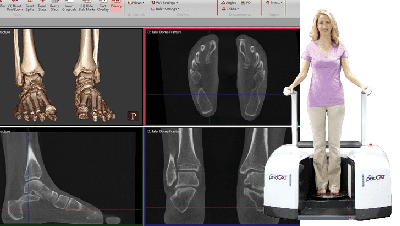
In-Office Foot CT Scan We Offer State-of-the-Art Standing CT Imaging
Your doctor may determine your X-Ray does not provide enough information about your injury and may order a standing foot CT scan. CT scans provide a complete 3D picture of your bone alignment and joint spaces.
The American Orthopedic Foot & Ankle Society recommends standing (weight bearing) imaging, when possible, to get the most accurate assessment of the functional bony anatomy of the foot and ankle.
Deformities of the forefoot, midfoot, and hindfoot have been shown to be more visible in standing position.
Standing CT is perfect for:
- Pre-operative planning
- Post-operative planning
- Diagnosis of fractures
- Evaluation of arthritic joints
- Evaluation of bunion deformity
- Evaluation of ankle instability
- Evaluation of foot alignment
- Sesamoid position and condition
What is a CT Scan?
Computed tomography (CT) technology acquires and combines multiple X-Ray projections to create a three-dimensional true representation of bones and joints.
How is a Standing Foot CT Scan Taken?
To get a standing CT scan, you step on to a circular platform. The platform is about 2 inches off the ground, and there are handlebars on either side of the platform to assist you. There is a cushioned seat attached to the back of the system in case you are unable to stand. You stand in place as the entry doors, which are not taller than the height of an average person’s knee, close in front of you. The operator will start the scan, and you will be asked to stay completely still for 30 – 60 seconds. Then the doors will re-open and you will be able to step out.
How is a Standing CT Scan Different from a Traditional CT Scan?
Traditional computed tomography requires patients to lie still on a table, which slides into the center of the CT scanner.
When a scan is taken in the standing position, physicians can evaluate alignment of the bones and joints. For example, physicians can clearly see if the ankle is rotated out of position, or if joint space is compromised in the midfoot.
In a traditional CT scan, the foot is in a relaxed position. Although there are methods to “simulate” the standing position while the patient is lying on a table, the best way to evaluate foot and ankle biomechanics is to have the patient stand.
Standing CT uses cone beam CT technology, which means the X-Ray tube only needs to make one revolution around the foot & ankle to capture the entire region of interest. Traditional medical CT must make several rotations around the patient to capture the region of interest.
What Questions Should I Ask My Doctor?
Not all standing CT systems have the same field of view. Some standing CT systems can only capture a part of a foot. In those systems, patients have to divert some of their bodyweight outside of the platform. Ask your doctor if viewing the entire foot is necessary to properly understand your condition or injury. Also, ask if you will be able to stand in a natural position during your scan. If your doctor answers no, you may want to seek a provider who offers pedCAT standing CT scans.
How is My Scan Used?
Your treating physician and a radiologist typically work together to analyze your scan. You may be provided with a radiology report. You can request a copy of your scan. It will be provided to you as a .DICOM file. There are a number of free .DICOM viewers available for download if you would like to view your scan.
What do I need to know about radiation dose?
A standing CT scan exposes you to about 2 – 6 micro Sieverts of radiation. To put this in perspective, the average American is exposed to about 8 micro Sieverts of radiation a day from his or her environment. Passenger on a flight from Los Angeles to New York are exposed to about 40 micro Sieverts of radiation. Peer reviewed studies state the radiation dose of a standing CT scan is insignificant and should not be a deciding factor when determining if a patient needs a scan.
In-office CT scans are available only at the 60th St. office.
